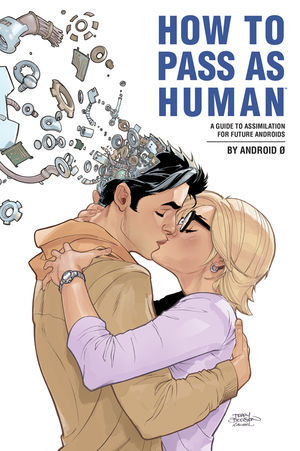A talk with Nic Kelman, author of HOW TO PASS AS HUMAN
I recently sat down with Nic Kelman to discuss his new book, HOW TO PASS AS HUMAN, Illustrated by Pericles Junior with a gorgeous cover by Terry Dodson and published by Dark Horse. The book is a manual created by Android Zero, who calls himself Zach, as he attempts to make sense of what it means to be human so he can pass among us unnoticed. The thing about this fun and smart read, is that while we may become less concerned with not being noticed or fitting in, we are all in our own way trying to pass as something.
Zach, the world's first android, collects his observations and experiences into a guide book that he plans to leave behind for the benefit of future droids who will need to pass as human.
And while Zach is able to collect, categorize, and synthesize voluminous quantities of data about humans, it's his ability to gain emotional intelligence that drives the narrative. Zach's experiences lead him to incrementally gain an understanding of desire and guilt and sacrifice.
HOW TO PASS AS HUMAN falls clearly on the side that intelligence can't be programmed and must be experienced. Kelman points out that our brains form through interaction with the outside world, through what's known as deep learning. They can't learn in a vacuum. They need experiences and retrieval of those experiences.
The text shifts between its narrative and its info-graphic, non-narrative sections that present Zach's findings about humans. The guide-book sections are related to the narrative, but they are not limited to the narrative and are therefor able to add much fun material that would have slowed down the story. For Kelman, these sections allowed him to include more of Zach's observations and findings without awkwardly forcing them into the narrative.
There are sections about the value of art, work, fun, and how to chose a gender among others. What is clear is that Zach is using this information to pass as human, and that means avoiding attracting attention to one's droidness. The best way to do that is to learn the stereotypes, because they are the prevailing behavior. It's clear that Kelman would prefer these stereotype not be true, but mimicking the stereotypes is precisely what Zach must do in order to move though his world undetected.
For Kelman, the fear of being worried about being wiped out by intelligent androids is a bit unrealistic. "Artificial organisms are fragile. Think your smart phone being dropped or getting wet. The fact is," he went on, "it doesn't seem like we've advanced that much in Artificial Intelligence. There have been amazing advances in algorithmic learning, like face recognition, but it's not Artificial Intelligence. But, I'm not sure why there is the assumption that we can go from not flying to putting man on moon. Why can't there be Artificial Intelligence that is as smart as a dog. That would be fun."
"The best science fiction," Kelman said, "takes a cool idea based in real science and then explores human relationships that could never exist. It's a replacement for magic and fairy tales. The science is analogous to the spell or the curse or the blessing. When so many stories have already been told, science fiction lets us create what-ifs that are not part of reality and allows us to tell good stories."
HOW TO PASS AS HUMAN is all that.
In the end, it may be our ability to keep rewriting our story, to keep adding new what-ifs, that is our best thing as humans.


